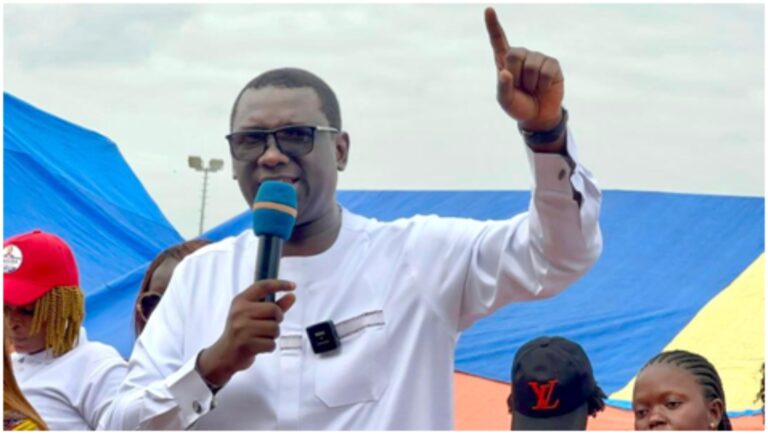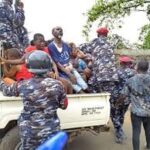“If Resilience Were Resistance”
By Sheriff Mahmud Ismail (Inspired by Hassan Arouni’s Review)
This poem “If Resilience Were Resistance” by Oumar Farouk Sesay is as powerful in its attempt to rousing consciousness as it is instructive in condemnation of the failure and the rot in politics . It is an outpouring of emotions in a direct and unveiled manner – anger, pain, yearning for a better governed country.
Farouk Sesay takes no prisoners and doesn’t give a damn about how his blistering tone and diction are perceived by the ‘abusive’ political class. Right from his opening lines, one cannot help but recognise his anger at, and disdain for the depravity of unyeilding power.
“If only they would shut up…after raping our dignity to justify their violations.”
Throughout the poem, like Ayi Kwei Armah, the Ghanian writer of ‘The Beautiful Ones Are Not Yet Born,’ the poet effectively utilises several literary devices including simili and metaphor to explore the themes of exploitation, corruption, poverty, pain etc; inflicted upon the masses by the rotteness of the political system (class).
The imagery of rotteness and pain in ‘festering flesh,’ ‘yanked like a rotting tooth’, ‘dull the ache’, ‘carved deep into our bones’ and ‘maims the mind’ are reinforced in the succeeding stanzas with expressions such as ‘spoiled saliva’, ‘chew our future with glee’ – apparently referring to the rotteness and lack of conscience by those holding the levers of power..
Wherever he laments the suffering of the people, he points out the insensitivity of those in power – ‘from the gashes of the art’…’to perfume the stench of ruin,’ the imagery and parallelism are unmistakable.
The writer leaves no one in doubt about his loathing of the word ‘resilience’, which he believes has been overused and without due deference to its true meaning . For him, the perpetrators merely use it to placate the victims and numb them to their incompetence, violence and thieving .
On the same breadth, he laments that apparent numbness, the inability to ‘resist’ the incessant abuse.The poet brings out, vividly, his frustration over the failure of the public to do anything to break free.
He also employs repetition to underscore his frustration over the perpetrating effects of such public indifference and inaction. In addition to the metaphor ‘as we bandage the wound’, he uses the word ‘silence’ about three times to capture that sentiment of keeping mum – apparently to inspire ‘resistance?’
As he progresses in his lamentation, the writer appears to hope for some change of attitude by the political class when he pontificates: ‘if only they would own their wreckage.’ But that hope is shortlived because he has no faith in the system. His scepticism is made loud and clear immediately after his expression of hope: when he asks: ‘
‘And what if we paused and listen?
Would we not hear the silence of all they erased?’
The oxymoron, ‘hear the silence’ powerfully captures the brazen nature – uncamouflaged – of the abuse staring the victim in mockery.
The rhytm of the writer’s frustration over the public’s numbness, including the himself, for doing nothing reaches a crescendo in the third to the last stanza. Craving for self preservation he urges them to “yank” away, “wretch the chains” to “unfetter and unbow themselves.
As if he is not sure his urging is loud enough, the poet repeats the call for resistance apparently making the point that enough should be enough:
“If only we had unlearned the endurance and spoken in flame not resilence, this land might blaze into paradise.’
Then, he transitions from faint hope to hopelessness – like one who has given up on any chance that there would ever be a remedy to the festering bad governance culture.
And it seems that it is because he has also lost faith in the institutions for justice, fairness, accountability, etc. He therefore recommends that the only way out lies in ‘resistance’..
But he also seems troubled by that possibility and to drive that point, at the end of the poem, the writer travels with the reader to the middle-east using a figurative potrait as vehicle. There, he points his reader to the dangers inherent in the failure of leadership at the level of global governance and the deafning silence by those who should speak out; and how all of that leave the people with nothing but their bare hands, stones and sticks to face bunker buster bombs, laser-guided missiles and B50/52 bombers.
With the use of the word ‘intifada’, the arabic term for resistance, the poet draws attention to the theatre of gleeful acts of abuse of power and the masterclass example of the suffering of people let down by the world. With that, he alludes to public resistance that could have happened if the pillage and insensitivity of his political class had occurred in that part of the world.
Oumar Farouk Sesay’s sharp rebuke, forthrightness and longing for a better society may have found expression in his powerful pen, but the real source of that power may have emanated from the names he carries.
The Arabic name Oumar (also spelled Omar or Umar) means “flourishing” or “long-lived”. It’s derived from the Arabic word “Umr,” which translates to “life”. The name also symbolizes a wish for a prosperous and enduring existence. Additionally, in Hebrew, the name means “eloquent speaker”.
“the one who distinguishes between right and wrong.”
Sheriff Mahmud Ismail is a Communications Specialist, Speech Writer,
Researcher, Strategist and Literary Enthusiast







Cities’ message to world leaders: Unlock direct climate finance for Africa’s urban future